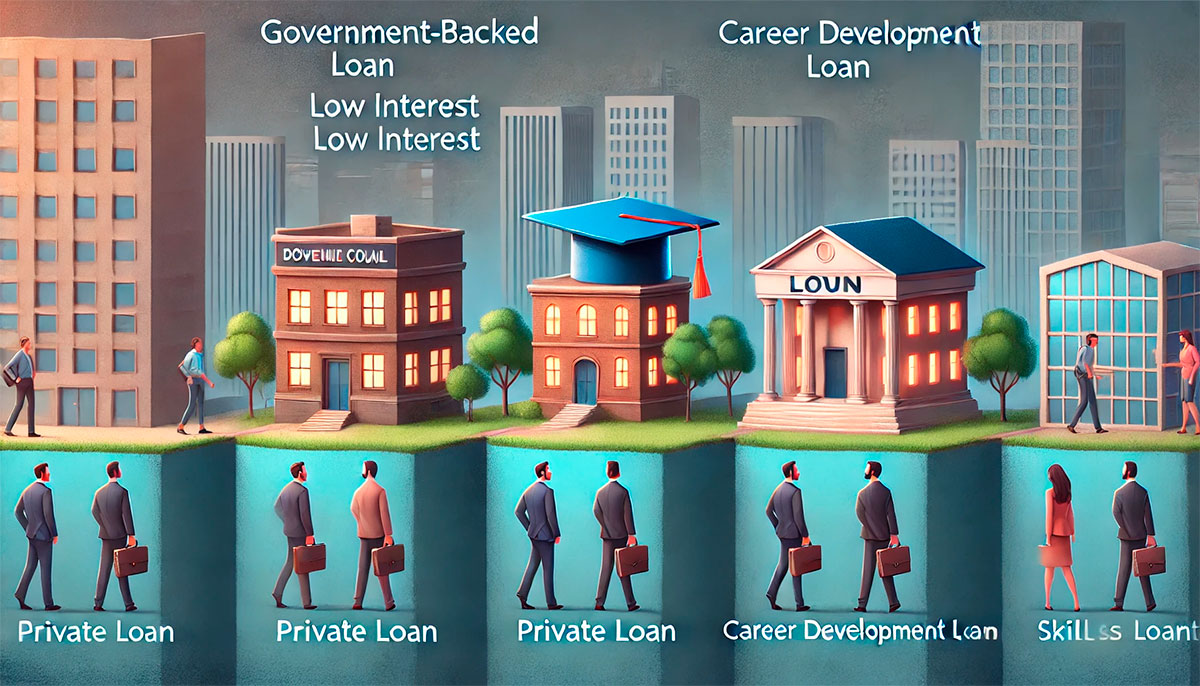
Investing in professional courses and career development is one of the most valuable steps you can take toward advancing your career and increasing your earning potential. Whether it’s gaining certification in a specialized field, completing a master’s degree, or enhancing your skills with a professional development course, these educational experiences often come at a cost. Loans designed for professional courses and career development can provide the financial support needed to invest in your future. In this article, we will explore the types of loans available for professional courses, how to use them wisely, and what to consider before borrowing.
Understanding Loans for Professional Courses
Loans for professional courses are specifically designed to help students, professionals, and career changers finance their education and skill development. These loans can cover a wide range of educational programs, including certifications, diplomas, degree courses, and short-term training programs aimed at improving job prospects or advancing in a current career. Depending on the type of course and the lender, you may be eligible for government-backed loans, private loans, or specialized loans for career development.
One of the key differences between loans for professional courses and traditional student loans is that they are often targeted at individuals who already have some work experience or have completed basic higher education. These loans allow individuals to further specialize their skills and qualifications, which in turn can lead to career advancement, salary increases, or a career switch.

Types of Loans for Professional Courses
There are several types of loans available to finance professional courses, each offering different benefits depending on your needs and eligibility. These loans are typically classified into three categories: government-backed loans, private loans, and specialized career development loans. Below is an overview of each type:
| Loan Type | Eligibility | Interest Rates | Repayment Terms |
|---|---|---|---|
| Government-Backed Loans | Available for certain professional courses and certifications, especially for career advancement in specific sectors | Lower than private loans, usually fixed | Flexible repayment options, often with deferred payments until employment |
| Private Loans | Offered by banks, credit unions, and online lenders for a wide range of professional development courses | Varies based on credit score and lender, can be fixed or variable | Repayment terms depend on the lender; may offer short-term or long-term options |
| Career Development Loans | Designed for individuals seeking career advancement or transitioning into a new field | Varies by loan provider; typically competitive rates for those with good credit | Typically 1 to 5 years, with the possibility of flexible repayment structures |
How to Use Loans for Professional Courses Wisely
Taking out a loan for professional courses can be a great way to invest in your career, but it’s important to use the funds wisely to ensure you’re maximizing the return on your investment. Here are several tips to help you make the most of your loan:
1. Choose the Right Course: Before borrowing money, ensure that the course or program you choose is recognized in the industry you want to work in. Look for programs that provide tangible skills that are in demand, as these will offer the best chances for career growth. Also, verify that the program aligns with your long-term career goals, whether you’re seeking to switch industries, gain a promotion, or enhance your current skill set.
2. Assess the Cost-Benefit Ratio: While professional courses can be expensive, it’s essential to weigh the potential return on investment. Research the salary increases or job opportunities that could result from completing the course. Some industries have a higher return on investment for advanced certifications, while others may not see as much of an immediate financial benefit. By considering the potential for career advancement and higher income, you can determine whether taking on debt for the course is worthwhile in the long run.
3. Plan Your Repayments: Take into account the repayment terms of the loan, and make sure they align with your future earning potential. For example, if you are taking a loan for a career switch, ensure that you have a plan in place for securing a job that will allow you to repay the loan comfortably. You may also want to consider loans with flexible repayment options or deferred payments, which can provide financial breathing room as you transition into a new role.

Choosing the Right Loan for Career Development
When deciding which loan to take, there are a few factors to consider that will help you make an informed decision. First, determine whether you are eligible for a government-backed loan, as these typically offer lower interest rates and better repayment terms. If a government loan is available, it’s often the best option, especially if you qualify for income-driven repayment plans or loan forgiveness programs after completing the course.
If government-backed loans are not an option, private loans can be a flexible alternative. Compare interest rates, fees, and repayment terms from various lenders to find the best deal. Private loans typically have stricter eligibility requirements, especially for individuals with limited credit histories, so consider using a co-signer to improve your chances of approval and secure a lower interest rate.
Specialized career development loans are another option to consider. These loans may be specifically designed for individuals looking to improve their skills or change careers. Career development loans may offer favorable interest rates and repayment options that are tailored to the needs of professionals who are enhancing their qualifications. These loans can be a good fit for individuals who want to invest in high-quality training programs without going through traditional educational loan processes.
Alternatives to Loans for Professional Development
While loans can provide necessary funding for professional courses, there are several alternatives to consider if you want to minimize your financial burden. Scholarships, grants, and employer-sponsored education programs are great options for financing your career development without taking on debt. Many companies offer educational assistance programs, which may include funding for certifications, training, and even degree programs related to your job. In addition, several professional organizations and institutions provide scholarships and grants specifically for career advancement and certifications.
Moreover, some employers offer to pay for your education upfront in exchange for a commitment to stay with the company for a specified period after completing the course. If you’re working, inquire about any educational benefits your employer may offer to reduce or eliminate the need for loans.
Loans for professional courses and career development can be an excellent way to invest in your future, whether you’re aiming to enhance your skills, advance your career, or switch industries. By understanding the different types of loans available, choosing the right course, and using the funds responsibly, you can achieve your professional goals without taking on excessive debt. Always weigh the pros and cons of borrowing for education, and explore all available alternatives to minimize your financial commitment. With careful planning and strategic loan management, professional courses can provide the foundation for a successful and rewarding career.




